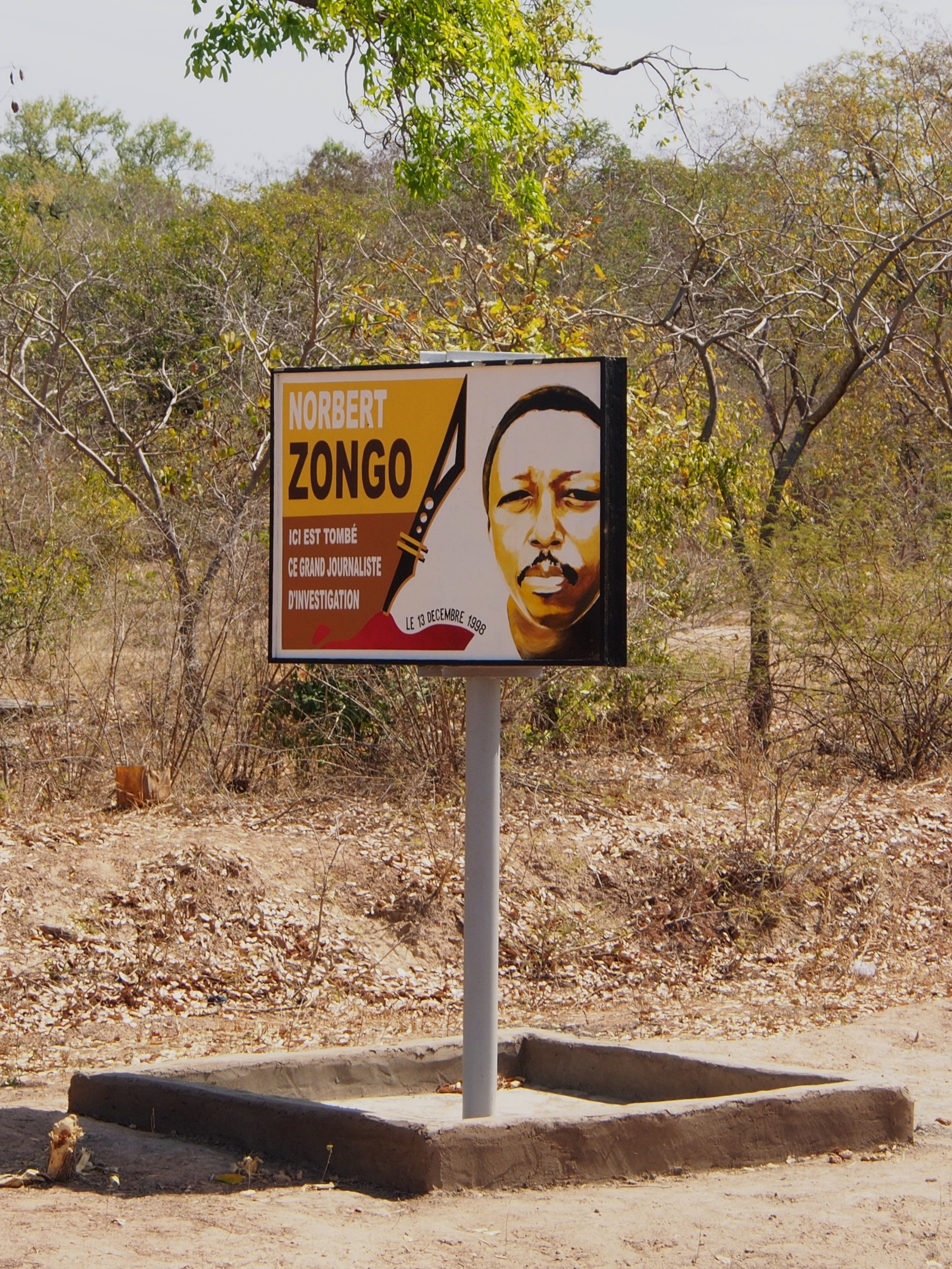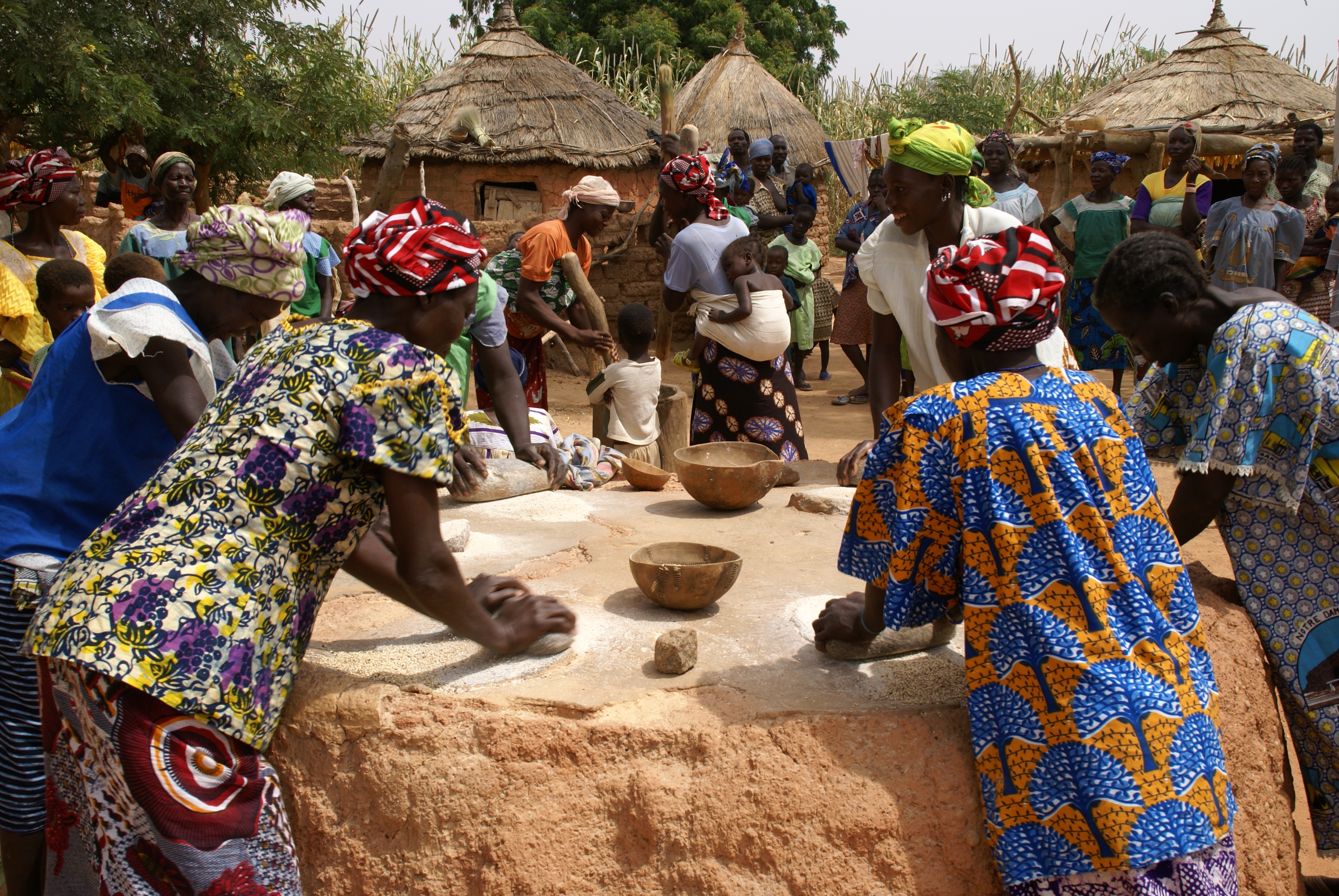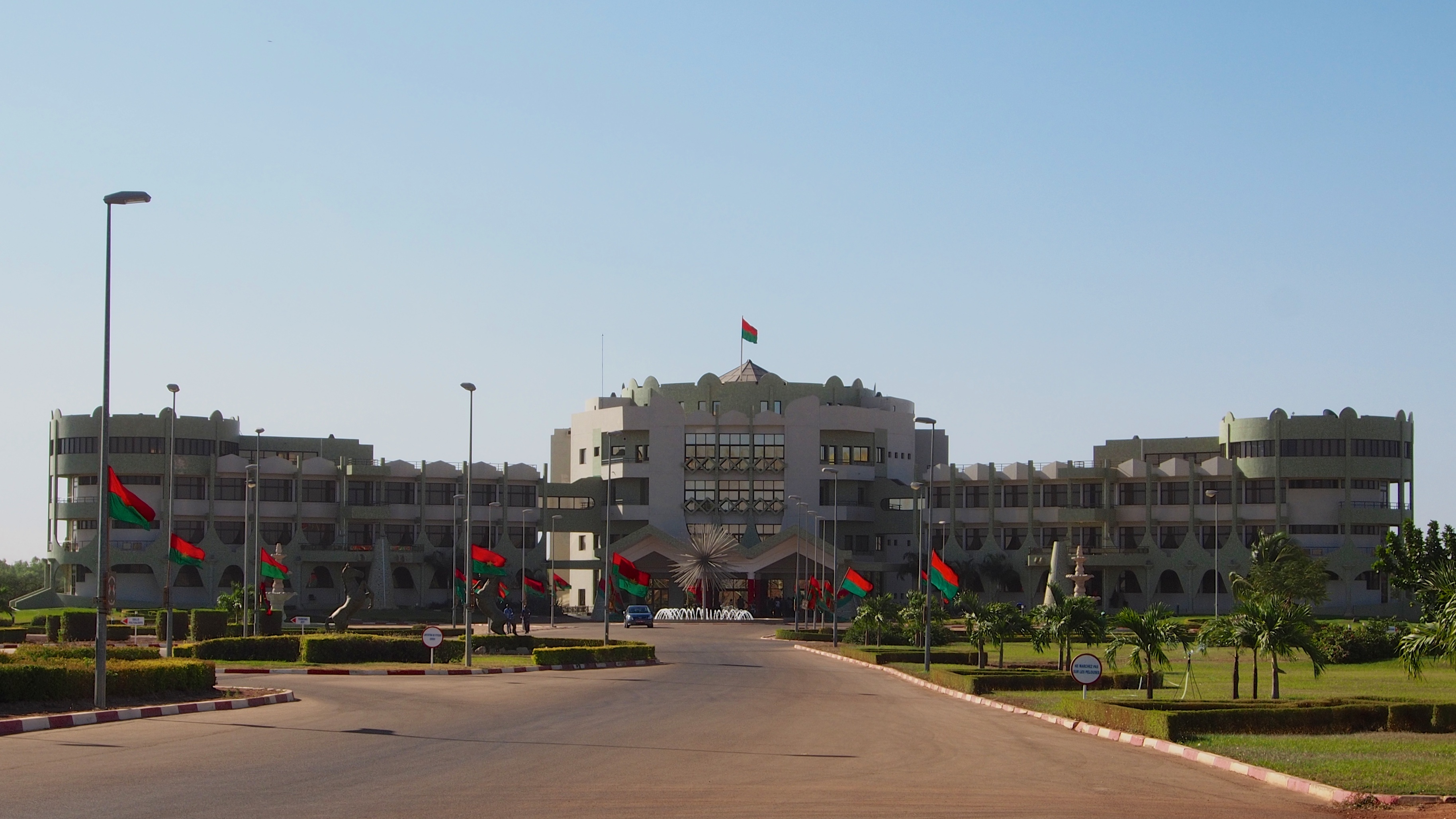|
Burkina Faso Armed Forces
The Burkina Faso Armed Forces (french: Forces armées du Burkina Faso) is the term used for the national military of Burkina Faso. The service branches of the armed forces include its Army, Air Force, National Gendarmerie and People's Militia. Being a landlocked country, Burkina Faso has no navy. History In 1966 a military coup deposed the first president of Upper Volta, Maurice Yaméogo, suspended the constitution, dissolved the National Assembly, and placed Lieutenant Colonel Sangoulé Lamizana at the head of a government of senior army officers. The army remained in power for 4 years; on June 14, 1970, the Voltans ratified a new constitution that established a 4-year transition period toward complete civilian rule. Lamizana remained in power throughout the 1970s as president of military or mixed civil-military governments. After conflict over the 1970 constitution, a new constitution was written and approved in 1977, and Lamizana was reelected by open elections in 1978. ... [...More Info...] [...Related Items...] OR: [Wikipedia] [Google] [Baidu] |
Coat Of Arms Of Burkina Faso
The coat of arms of Burkina Faso contains a shield based on the national flag. Above the shield the name of the country is shown, while below it is the national motto, ''Unité, Progrès, Justice'' (French for "Unity, Progress, Justice"). The supporters are two white stallions. The two plants emerging from the lower banner appear to represent pearl millet, an important cereal grain cultivated in this country where agriculture represents 32% of the gross domestic product. This coat of arms is similar to the old Upper Volta coat of arms (see below), with the Burkina Faso flag replacing the Upper Volta flag in the middle. The coat of arms and its meaning is mandated by Law No 020/97/II/AN. Official blazon * one escutcheon bearing in the chief on a ribband argent the name of the country: "BURKINA FASO"; * in fess point an inescutcheon of two bands in fess with the banner of arms, sewn upon two crossed spears; * two stallions rampant argent supporting on each side the escutcheo ... [...More Info...] [...Related Items...] OR: [Wikipedia] [Google] [Baidu] |
1966 Upper Voltan Coup D'état
The 1966 Upper Voltan coup d'état was an event which took place on 3 January 1966 in the Republic of Upper Volta (today Burkina Faso), when following large-scale popular unrest the military intervened against the government, forced President Maurice Yaméogo to resign, and replaced him with Lieutenant Colonel Sangoulé Lamizana. Lamizana would go on to rule until 1980, when yet another military ''coup d'état'' overthrew him. The 1966 coup would prove to be the first in a long line of Upper Voltan and later Burkinabé coups, both failed and successful such, and marked the beginning of half a century of military rule. History Background French Upper Volta, a small, landlocked and largely impoverished colony of France had been decolonized in 1960. Maurice Yaméogo, a close ally of the Ivorian President Félix Houphouët-Boigny, created a single-party dictatorship, making his own Voltaic Democratic Union the sole legal political party in the country. Opposition parties, like the Af ... [...More Info...] [...Related Items...] OR: [Wikipedia] [Google] [Baidu] |
2014 Burkinabe Uprising
The 2014 Burkina Faso uprising was a series of demonstrations and riots in Burkina Faso in October 2014 that quickly spread to multiple cities. They began in response to attempts at changing the constitution to allow President Blaise Compaoré to run again and extend his 27 years in office. Pressure for political change came from civil society and in particular from the country's youth. Following a tumultuous day on 30 October, which included the involvement of former Defence Minister Kouamé Lougué and the burning of the National Assembly and other government buildings as well as the ruling Congress for Democracy and Progress party's headquarters, Compaoré dissolved the government and declared a state of emergency before eventually fleeing to Côte d'Ivoire with the support of President Alassane Ouattara. General Honoré Nabéré Traoré announced that a transitional government would run the country until an election within 12 months. After another day of mass protests and ... [...More Info...] [...Related Items...] OR: [Wikipedia] [Google] [Baidu] |
Regiment Of Presidential Security
The Regiment of Presidential Security (french: Régiment de la sécurité présidentielle, RSP), sometimes known as the Presidential Security Regiment, was the secret service organisation responsible for VIP security to the President of Burkina Faso, a landlocked country in West Africa. It was autonomous from the Army. Until 31 October 2014, the President was Blaise Compaoré, a military officer who came to power in a 1987 coup d'état. The elite unit was well known for its frequent involvement in the politics of Burkina Faso, acting as the iron fist of President Compaoré in his domination of the country. They were said to be widely feared by many people in the country, which in 2012 – two years prior to the end of Compaoré's government – was described by the Democracy Index as an "authoritarian regime". After 2014 Burkinabé uprising, on 1 November 2014, Lieutenant Colonel Yacouba Isaac Zida – deputy commander of the Regiment of Presidential Security – briefly took ... [...More Info...] [...Related Items...] OR: [Wikipedia] [Google] [Baidu] |
2015 Burkinabe Coup D'état
Fifteen or 15 may refer to: *15 (number), the natural number following 14 and preceding 16 *one of the years 15 BC, AD 15, 1915, 2015 Music *Fifteen (band), a punk rock band Albums * ''15'' (Buckcherry album), 2005 * ''15'' (Ani Lorak album), 2007 * ''15'' (Phatfish album), 2008 * ''15'' (mixtape), a 2018 mixtape by Bhad Bhabie * ''Fifteen'' (Green River Ordinance album), 2016 * ''Fifteen'' (The Wailin' Jennys album), 2017 * ''Fifteen'', a 2012 album by Colin James Songs * "Fifteen" (song), a 2008 song by Taylor Swift *"Fifteen", a song by Harry Belafonte from the album '' Love Is a Gentle Thing'' *"15", a song by Rilo Kiley from the album ''Under the Blacklight'' *"15", a song by Marilyn Manson from the album ''The High End of Low'' *" The 15th", a 1979 song by Wire Other uses *Fifteen, Ohio, a community in the United States * ''15'' (film), a 2003 Singaporean film * ''Fifteen'' (TV series), international release name of ''Hillside'', a Canadian-American teen drama *F ... [...More Info...] [...Related Items...] OR: [Wikipedia] [Google] [Baidu] |
Tenkodogo
Tenkodogo is the capital city of Boulgou Province and the Centre-Est Region of Burkina Faso with a population of 61,936 (2019). Economy The villages surrounding Tenkodogo are primarily based around animal husbandry. The main market takes place every 3 days. The Restaurant Patisserie Salon du Thé is known for its tea, yoghurt and pastries. The Le Rotisseur restaurant is known for its grilled chicken. Notable hotels include Hotel Djamou, Hotel Djamou Annexe, Hotel Laafi, and Auberge Riale. Politics On 29 January 2016, the king of Tenkodogo, Naba Saga, died while in Thailand for hospital care. He was the 28th king of Tenkodogo according to tradition and was inducted on 5 October 2001. He had taken the position after the death of his father, Naba Tigre, in September 2001. He was succeeded by Naba Guiguem-Pollé as king. Transport The town is connected to Koupéla and Bittou, along the N15 highway. Climate Köppen-Geiger climate classification system classifies its climate ... [...More Info...] [...Related Items...] OR: [Wikipedia] [Google] [Baidu] |
Kaya, Burkina Faso
Kaya is the fifth largest city in Burkina Faso, lying northeast of Ouagadougou, to which it is connected by railway. It is a centre for weaving and tanning. Kaya is the capital of Sanmatenga Province. It is located from Ouagadougou, the capital of Burkina Faso. Demographics Kaya has a population of 121,970 (2019 census). Population growth: Infrastructure Kaya Airport is a public airport in Kaya. As of 2014 it did not have any scheduled commercial flights. In 1988 Kaya was connected by railway to OuagadougouHistorical Dictionary of Burkina Faso, by Lawrence Rupley, Lamissa Bangali, Boureima Diamitani, 2013, third edition, Scarecrow Press, Inc. but, as of 2014, there were no passenger services available. Kaya is a road junction for the N3 and N15 national highways that link the city with Dori, Ouagadougou and Pouytenga, Boulsa, Kongoussi and Ouahigouya, respectively. Education *technical college for girls *secondary school Climate Köppen-Geiger climate cla ... [...More Info...] [...Related Items...] OR: [Wikipedia] [Google] [Baidu] |
2011 Burkinabé Protests
The 2011 Burkina Faso protests were a series of popular protests in Burkina Faso. Background On 15 February, members of the military mutinied in the capital Ouagadougou over unpaid housing allowances; President Blaise Compaoré briefly fled the capital and sought safety in his hometown of Ziniaré. By Sunday 17 April, the mutiny had spread to the town of Pô in southern Burkina Faso; there were also protests over a court's decision to sentence several officers to prison sentences. Protests The mutiny followed popular protests over rising prices in several cities across Burkina Faso, and protests starting 22 February over the death of a student in police custody in February, as well as the shooting of several other protesters. Five student protesters were reportedly killed in February. France24 suggested that Burkina Faso could be caught up in a full-scale uprising similar to that seen in several North African and Middle Eastern countries, proposing the rise of a "Burkinabè Spr ... [...More Info...] [...Related Items...] OR: [Wikipedia] [Google] [Baidu] |
Blaise Compaoré
Blaise Compaoré (born 3 February 1951)''Profiles of People in Power: The World's Government Leaders'' (2003), page 76–77."Biographie du président" website of the Presidency . is a Burkinabé-Ivorian former politician who served as the second president of Burkina Faso from 1987 to 2014. He was a close associate of the first president, Thomas Sankara, during the 1980s, and in October 1987, he led a coup d'état during which Sankara was killed. Subsequently, he introd ... [...More Info...] [...Related Items...] OR: [Wikipedia] [Google] [Baidu] |
Thomas Sankara
Thomas Isidore Noël Sankara (; 21 December 1949 – 15 October 1987) was a Burkinabé military officer, Marxist–Leninist revolutionary, and Pan-Africanist, who served as President of Burkina Faso from his coup in 1983 to his deposition and murder in 1987. Viewed by supporters as a charismatic and iconic figure of revolution, he is commonly referred to as 'Africa's Che Guevara'. After being appointed Prime Minister in 1983, disputes with the sitting government led to Sankara's eventual imprisonment. While he was under house arrest, a group of revolutionaries seized power on his behalf in a popularly-supported coup later that year. Aged 33, Sankara became the President of the Republic of Upper Volta. He immediately launched programmes for social, ecological and economic change and renamed the country from the French colonial name Upper Volta to Burkina Faso ('Land of Incorruptible People'), with its people being called Burkinabé ('upright people'). His foreign policies w ... [...More Info...] [...Related Items...] OR: [Wikipedia] [Google] [Baidu] |
Jean-Baptiste Ouédraogo
Jean-Baptiste Philippe Ouédraogo (; born 30 June 1942), also referred to by his initials JBO, is a Burkinabé physician and retired military officer who served as President of Upper Volta (now Burkina Faso) from 8 November 1982 to 4 August 1983. He has since mediated a few national political disputes and operates a clinic in Somgandé. Ouédraogo received his early education in Upper Volta before joining the Upper Voltan Army and studying medicine abroad. After working in healthcare, he was appointed chief medical officer of the Ouagadougou military camp. He participated in the November 1982 coup d'état and shortly thereafter assumed the presidency. More ideologically moderate than most of his comrades, Ouédraogo did not command much popular support and governed the country amid an unstable political climate. A protracted dispute with Prime Minister Thomas Sankara resulted in his removal from power in a coup in August 1983 and imprisonment. He was released in 1985 and resu ... [...More Info...] [...Related Items...] OR: [Wikipedia] [Google] [Baidu] |
Saye Zerbo
Saye Zerbo (27 August 1932 – 19 September 2013) was a Burkinabé military officer who was the third President of the Republic of Upper Volta (now Burkina Faso) from 25 November 1980 until 7 November 1982. He led a coup in 1980, but was resisted by trade unions and was overthrown by Major Jean-Baptiste Ouédraogo and the Council of Popular Salvation (CSP). Biography Saye Zerbo was born Tougan, French West Africa, on 27 August 1932. He went to school in Mali and Saint-Louis, Senegal. Then he joined the French military in 1950 and attended the military academy Saint-Cyr. As a paratrooper, Zerbo took part in both the First Indochina War and the Algerian War of Independence. After Upper Volta's independence from France in 1960, he transferred to that country's army in 1961. In the military government of Sangoulé Lamizana, who ruled Upper Volta from 1966, Saye Zerbo was minister of foreign affairs from 1974 to 1976. He also held the positions of commander of the regiment in the cap ... [...More Info...] [...Related Items...] OR: [Wikipedia] [Google] [Baidu] |



